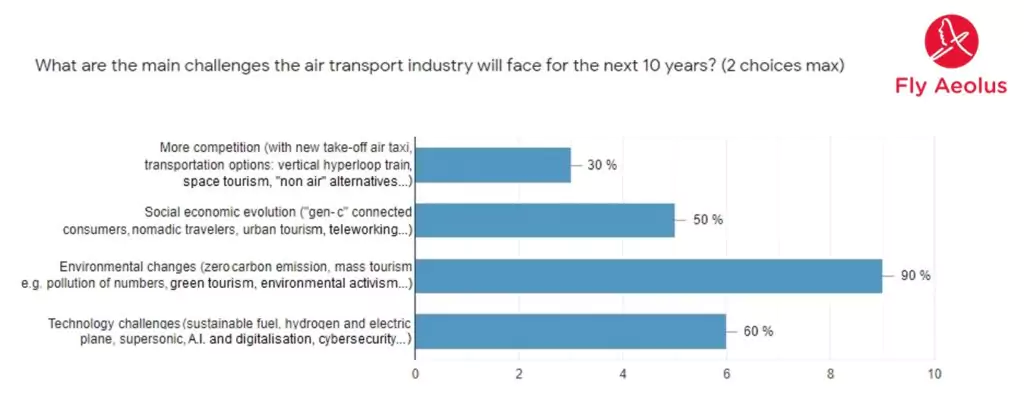By Frédéric Messina
The Covid-19 crisis, by its nature and by its magnitude, has impacted all of us. Individuals or companies are reacting in different ways. Together with the manufacturing industry, the air transportation sector has been one of the industries in the world which has been impacted the most. While this industry always had the ability to recover fast from previous crises, beat growth records it is relevant to understand how this sector would react to an unexpected crisis, of historic magnitude and study its capacity for resilience.
To do this, we interviewed a panel of experts through a survey, made up of 10 professionals from the air transportation sector: members from Amadeus, a supplier of IT reservation solutions for the global travel and tourism industry, members from national airlines and private jet compagnies and a member from IATA, the International Air Transport Association. Our data analysis and our main results have shown that several convergences of opinion have been reached and have therefore made it possible to establish several trends and perspectives on the future of the air transportation sector.
When will the air transportation sector recover?
Customer’s demand will pick up again from the year 2022 according to 80% of experts. This recovery will be slow and will be directly linked to the vaccination rate in the world and to the reduction of the health restrictions by countries. The full recovery of the sector will not take place before 2023 according to 90% of experts.

How will the air transportation sector recover?
The recovery of the sector will not be homogeneous and will be structured differently per sector and carrier. This recovery will be led by leisure travel according to 100% of the experts. Indeed, people are eager to go on vacation after the lockdown periods and will take every opportunity to see each other again. The recovery of business travel, on the other hand, will be a little bit longer as businesses got used to other alternatives such as remote working technology that have proven to be effective. However, it will never replace face to face interaction hence business travel.
According to 90% of experts the market pick up will therefore be led by the low-cost airlines. Compared to the traditional airlines, these carriers have proven to be the most resilient due to their flexibility, their responsiveness to the customer demand and their low exposure to long-haul traffic.
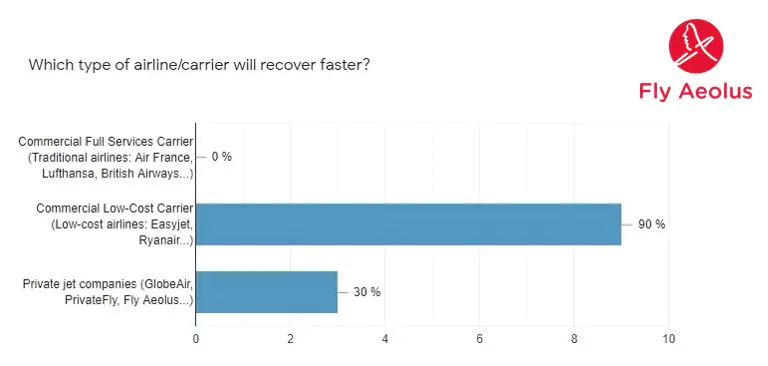
What about private jets sector? 30% of experts believe that private jet companies will also experience a relatively fast recovery. Indeed, this segment appears to be an alternative to traditional airlines which reduced their routes and cancelled their flights due to the low demand. Hence it is taking an advantage of this crisis by offering attractive prices and therefore attract new travellers. In this case, the future might be bright for local air taxis which can boost the market. Private flights will therefore certainly do better than before the crisis, but their capacity remains insufficient to influence the industry’s overall recovery.
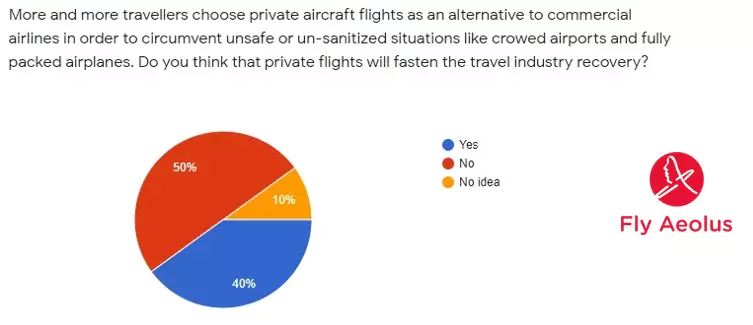
Are changes to be expected?
During this recovery, new business models will emerge, some airlines will significantly reduce their scope of operation and not avoid consolidation. After the crisis, the market pie to share will be less. By adapting their business model airlines will be able to recover from the crisis as they will be forced to reduce their capacity, abandon certain routes (or turn to those that are profitable) and reduce their scope.
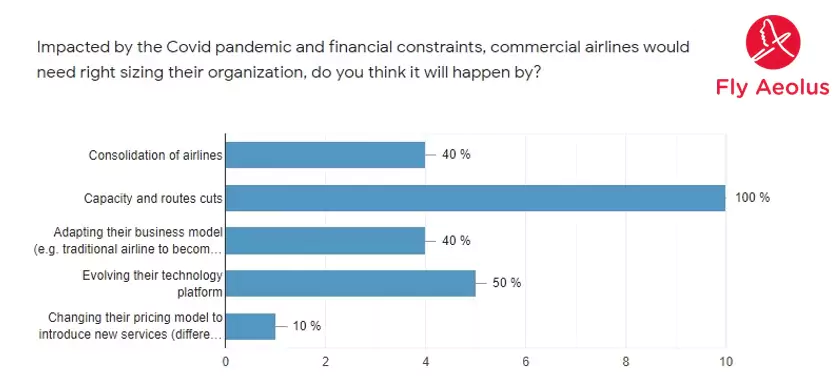
The air transportation industry will return to lower levels of production than before the crisis according to 60% of experts. This is due to environmental considerations and the global economic situation, which will lead to the end of mass tourism. Nevertheless, 40% of experts do not share this opinion. According to them, airlines will adapt to this evolution and see no obstacle to the recovery of the sector.
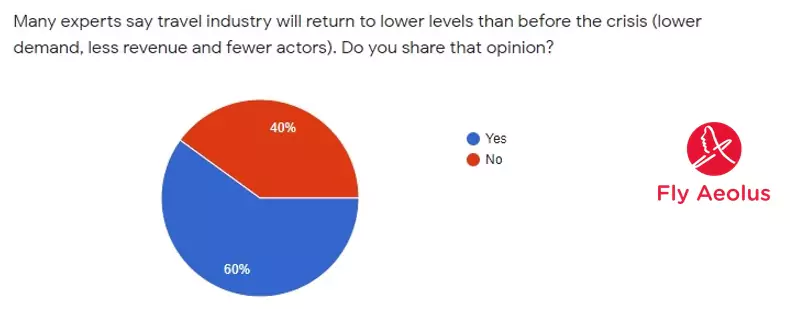
What solutions will be provided to recover?
The recovery will revolve around the digitization of processes, a new customer experience and collaboration between the actors of the sector. According to the majority of experts, the recovery of the sector will require an increase in health security in order to strengthen passenger confidence by making airport and air operations much more efficient and intelligent. Think about the health passport or contactless technologies which are seen as the two main solutions which should be put in place that will accelerate the recovery.
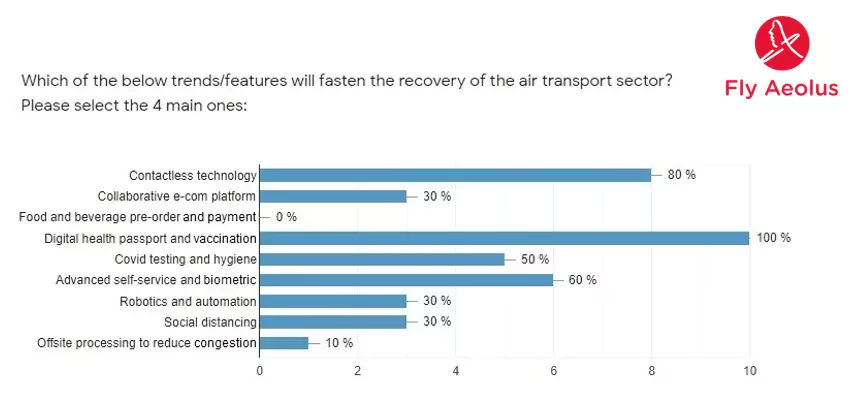
New customer requirements focused on health and safety will thus dictate new commercial offers that will have to be personalized and much more flexible according to a large majority of experts.
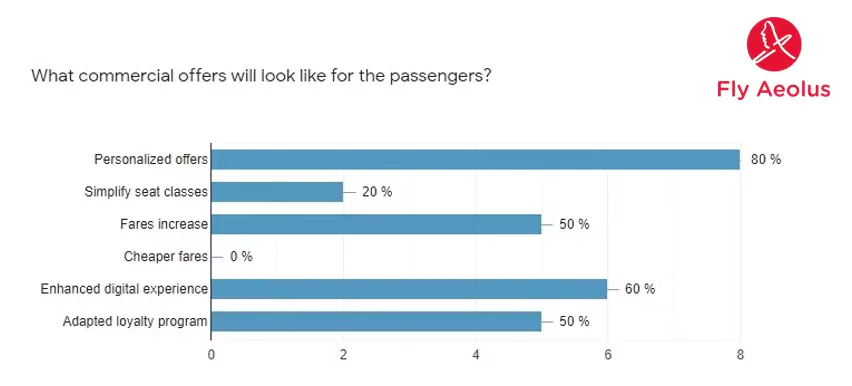
Is there a future for the air transportation sector?
These trends allow us to admit that the solutions provided to the recovery from the crisis will allow the air transportation sector to find a new balance, breaking with the old situation. We are therefore facing a scenario that has never taken place and a historic turning point for the air transportation sector, which has always been able to recover from the various crises (terrorism, geopolitics, economics, etc.) by regaining its growth and its state of balance prior the crisis. A multitude of factors (behavioural, financial, environmental, and technological) will therefore force the sector and its actors to adapt their business models, which will change the way they work forever. Indeed, according to experts, the main challenges the air transportation sector will face in the next 10 years are environmentally driven (90%), social economic evolutions (50%) and technological challenges (60%).
